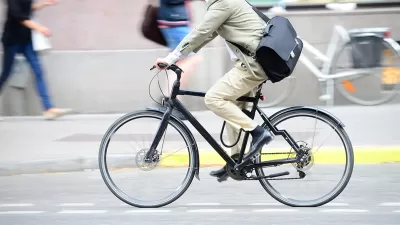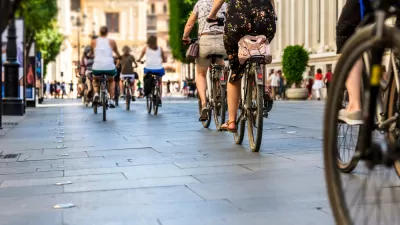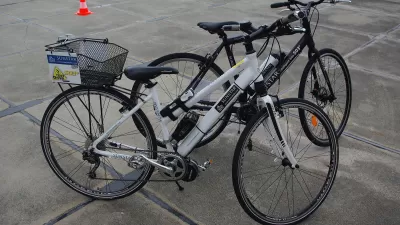The flexible credit is meant to support a variety of bike-related expenses, including bike share memberships.

Eric Sakalowski assesses the federal bike commuter credit proposed as part of the bicycle benefits in the Build Back Better Act, which is intended "to cover a broad range of expenses that a person might incur as they commute to work by bike." The program doesn't require a new bike purchase and covers things like bike share memberships. "[E]mployers can offer employees up to $81 a month in benefits that are not subject to income tax," a much higher benefit than the $20 provided in an earlier version of the credit.
"Even more importantly, a coordination provision allows the same person to claim the bike commuter benefit and the transit and parking benefits under existing law," which allows "more occasional bike commuters to claim the benefit thereby fostering more commutes by bike for those who do more mixed forms of transportation." Unfortunately, the credit does not apply to independent contractors or people not in the labor force, "and these groups tend to be disproportionately disadvantaged." Meanwhile, the seemingly generous $81 monthly benefit is substantially less than the $270 offered by the transit and parking benefits.
Along with the e-bike credit, says Sakalowsky, the bike commuter credit "will not change the situation overnight, especially as we continue to lavish far richer tax credits on cars. But, they offer a foundation at the federal level on which we can continue to build."
FULL STORY: Op-Ed: What is the Federal Bike Commuter Benefit?

Planetizen Federal Action Tracker
A weekly monitor of how Trump’s orders and actions are impacting planners and planning in America.

Maui's Vacation Rental Debate Turns Ugly
Verbal attacks, misinformation campaigns and fistfights plague a high-stakes debate to convert thousands of vacation rentals into long-term housing.

Restaurant Patios Were a Pandemic Win — Why Were They so Hard to Keep?
Social distancing requirements and changes in travel patterns prompted cities to pilot new uses for street and sidewalk space. Then it got complicated.

In California Battle of Housing vs. Environment, Housing Just Won
A new state law significantly limits the power of CEQA, an environmental review law that served as a powerful tool for blocking new development.

Boulder Eliminates Parking Minimums Citywide
Officials estimate the cost of building a single underground parking space at up to $100,000.

Orange County, Florida Adopts Largest US “Sprawl Repair” Code
The ‘Orange Code’ seeks to rectify decades of sprawl-inducing, car-oriented development.
Urban Design for Planners 1: Software Tools
This six-course series explores essential urban design concepts using open source software and equips planners with the tools they need to participate fully in the urban design process.
Planning for Universal Design
Learn the tools for implementing Universal Design in planning regulations.
Heyer Gruel & Associates PA
JM Goldson LLC
Custer County Colorado
City of Camden Redevelopment Agency
City of Astoria
Transportation Research & Education Center (TREC) at Portland State University
Jefferson Parish Government
Camden Redevelopment Agency
City of Claremont





























